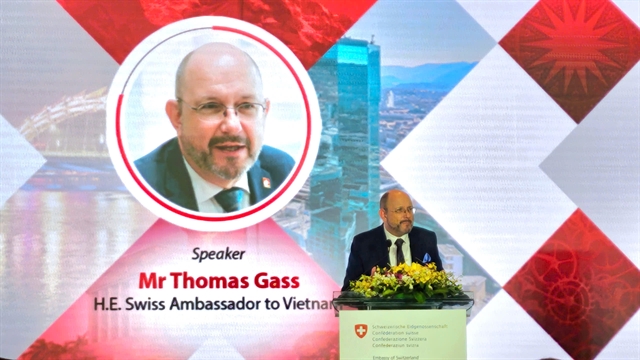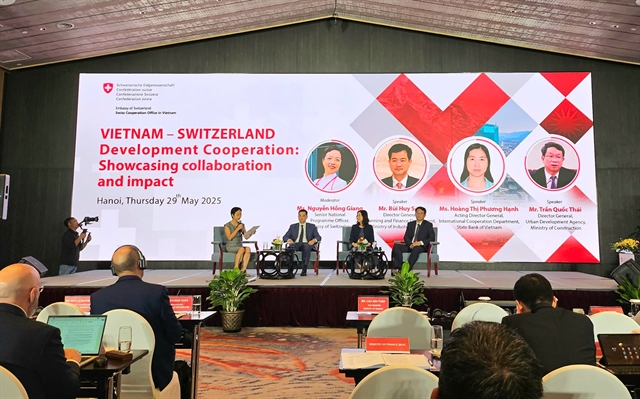Swiss cooperation has helped Việt Nam stabilise its financial system, expand access to capital for small businesses and introduce environmentally responsible practices in industry and urban development.

By Ly Ly Cao
HÀ NỘI — This year marks 35 years since Việt Nam and Switzerland began their formal development cooperation, a partnership that has not only weathered the test of time but also flourished into one of deep trust, innovation and tangible results.
At a landmark event in Hà Nội in the afternoon of May 29, leaders and stakeholders from both countries came together to reflect on past achievements and launch the next chapter in their bilateral development journey.
Since the beginning of Swiss development assistance to Việt Nam in 1991, Switzerland has committed over 650 million Swiss franc (US$800 million) in Official Development Assistance (ODA), evolving from a focus on poverty reduction to supporting sustainable economic growth, innovation and climate resilience.
“Over the past 35 years, Switzerland has invested about $800 million in this partnership. But more than numbers, it's the impact that matters,” said Thomas Gass, Switzerland’s Ambassador to Việt Nam.
“From public leadership to private sector entrepreneurship, Swiss expertise has contributed to knowledge transfer, skills development and innovative solutions that helped drive Việt Nam’s transformation into one of the most dynamic economies in the world.”
At the heart of the relationship is a shared commitment to inclusive and sustainable development.
Swiss cooperation, coordinated through the Swiss State Secretariat for Economic Affairs (SECO), has helped Việt Nam stabilise its financial system, expand access to capital for small businesses and introduce environmentally responsible practices in industry and urban development.
The results are visible not just in policy reforms or macroeconomic indicators, but also in the lives of entrepreneurs, farmers and communities across the country.
From aid to partnership
Swiss cooperation has adapted over the decades, shifting from traditional aid to transformative partnerships. Institutions such as the State Bank of Vietnam (SBV), the Ministry of Industry and Trade (MoIT) and the Ministry of Construction (MoC) have benefitted directly from Swiss expertise.
“We’ve received effective support from the Swiss government through capacity-building programmes for banking staff,” said acting director general at SBV Hoàng Thị Phương Hạnh.
She emphasised the importance of Switzerland’s advanced financial systems and voiced hope for deeper ties with Swiss financial institutions as Việt Nam moves to develop international financial centres.
She also welcomed SECO and the Swiss Embassy as vital bridges to future investment and knowledge exchange.
Trần Quốc Thái, director general of the Urban Development Agency at the Ministry of Construction, pointed to the urgent need for resilient urban systems amid escalating climate threats.
He expressed strong appreciation for Switzerland’s practical assistance, especially in helping Việt Nam integrate sustainable planning tools into its urban growth strategies.
“We hope to deepen our collaboration with SECO and Swiss experts to build cities that are not only smart but also climate-resilient,” he said.

Trade and innovation have been key themes in the partnership as well.
Bùi Huy Sơn, director general for the Planning and Finance Department at the Ministry of Industry and Trade, acknowledged the challenges in finalising a trade agreement with Switzerland and three other countries, but remained optimistic.
“We hope we are only a short distance from a deal,” he said, stressing the urgency of unlocking the mutual benefits that a trade accord would bring.
At the event, Ambassador Gass also proudly highlighted the presence of Swiss technology in Vietnamese enterprises, from Bühler machinery in VinFast factories to the contributions of Swiss pharma, construction and IT firms.
"Swiss companies already bring innovation into Việt Nam and our goal is to deepen this connection further, laying the groundwork for even more meaningful technology transfer," he said.
Looking ahead, the 2025–28 cooperation programme will carry this spirit into a new phase.
With a $50 million commitment, Switzerland will continue to work with Việt Nam to foster sustainable trade, strengthen public and private finance and advance climate-smart development.
As Ambassador Gass noted, these efforts align closely with Việt Nam’s goals of achieving high-income status by 2045 and net-zero emissions by 2050.
Beyond the headlines and funding figures, what stood out at the event was the deep sense of shared purpose.
"Let us work together to turn challenges into innovation and ensure that the economic transformation ahead is not only fast but also fair and inclusive," he said. — BIZHUB/VNS





